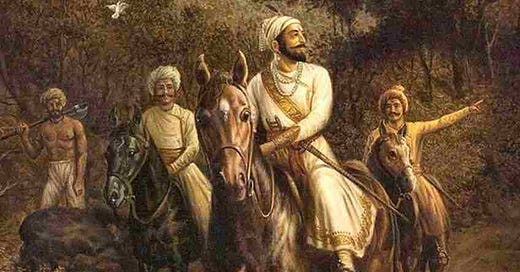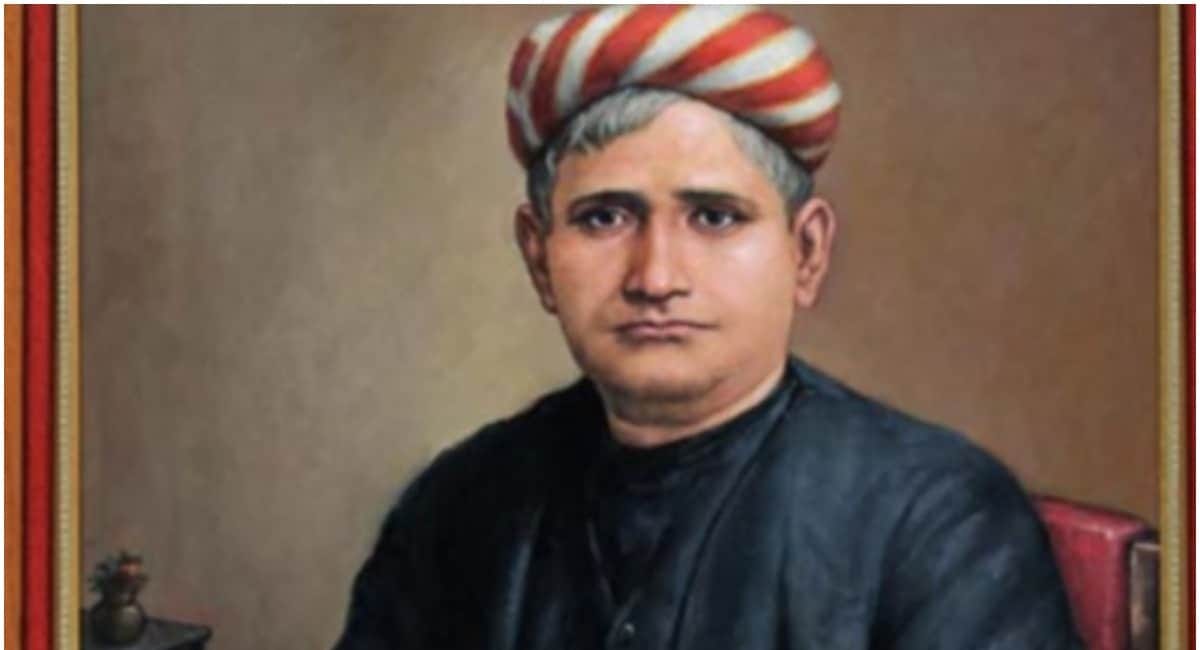Hindus should Unite, Strive for Freedom - Bankim's Relevant Counsel
A Brief Look at his 'Bharata Kalanka'.
“Why has Bharatavarsha been in slavery for such a long time?”
– Bankim Chandra
Bankim Chandra Chattopadhyay was one of the great giants of the Bengal Renaissance in the 19th century - which provided the Hindus of that time with much needed strength and self-confidence - and made the phoenix rise of Hindudom possible once again after a long spell of foreign domination.
What questions and issues these stalwarts of the Bengal Hindu Renaissance were grappling with, still remain relevant. It is highly beneficial for us to read about what they had to say about those important matters - the wisdom of ancestors and that of the past is often an effulgent lamp which illuminates the path to the future.
In this particular article, we will have a detailed look at Bankim's sharp and powerful, critical yet deeply patriotic essay - 'Bharata Kalamka' or 'The Blot on Bharatavarsha'.
We do not, and we need not, agree with Bankim's every point in this prescient essay, but we deem it good enough that today's readers - who read in English - would be benefited by being aware about the same.
~
Bankim begins the essay with a simple question: Why has Bharatavarsha been under foreign subjugation for such a long time? It was so in his own time that the British spread the idea - that this was so, because Hindus are an effeminate and cowardly people.
But was this the true reason for India's slavery?
Bankim disagrees. Bankim sharply points out that these same British officers highly praise the Indian soldiers employed in the British Indian Army - and because of whom the British had been able to acquire the military victory at Kabul. If Hindus were an effeminate and cowardly people, why would the same men who call them so, praise them when the Hindus work for the latter in the British Indian army? Thus, British hypocrisy on the question stands exposed.
But this was the story of the present - the current situation. But Bankim probes further, and ventures into hoary history. In the past, what was the martial prowess of the Hindus?
Going into the ancient past, we see that Hindus have defeated foreign invaders many a times - including Persians, Greeks, Shakas, Hunas, Arabs and Turks - all of them arrived, occupied India's northwestern regions for some period - and were thereafter driven away by the Hindus.
Quoting Bankim himself, the Muslims of Arabia:
“Within six years of the death of Mohammed, they conquered Egypt and Syria; within ten years, Persia; within one year, Africa and Spain; within eighty years, Kabul; within eight years, they had conquered the entirety of Turkistan. But in spite of making great efforts to conquer India for long three centuries, they could not conquer it.”
Bankim also points out that a single Muslim people couldn't conquer Bharatavarsha - it took the combined efforts of Arabs, Turks, Afghans and Pathans over several generations in order to effect the same.
Giving examples of the countries annexed by Islam, of Greece and Carthage by Rome, of Western Rome by barbarians and of Eastern Rome by Turks - Bankim points out that we often find that ancient nations are conquered by an aggressive imperial younger nation, in history. But at the same time, Bharatvarsha stands in distinction, for holding out in its defence for a much longer time.
Now, Bankim searches for the reasons this misconception - of Hindus not being a martial people - had gotten spread. There are three main reasons, according to him:
1) Terrible lack of historical documents and chronicles written from a Hindu point of view: Bankim points out that in any chronicle, the people who write the chronicle sing their own glories, and undermine the capability and prowess of their enemies. Unfortunately, Hindus' martial exploits are found mainly in chronicles of foreign and enemy authorities, like Greeks, Muslims and Europeans.
2) Hindu disinterest in foreign conquest: Because of religious and geographical reasons, Hindus didn't expand out of India. Non-expansionist and defensive nations are perceived to be lesser in martial ability.
3) Lastly, the recent history of Hindus as an enslaved nation, has enhanced this perception.
Now, this was one analysis, that about popular perceptions. But there is the deeper issue, which is also the central question of Bankim's essay - why has Bharatavarsha been in slavery for such a long time?
According to Bankim's view, this has mainly two reasons:
(1) Lack of love for national freedom among Hindus.
(2) Lack of tribal feeling among Hindus.
Let us elaborate on these two aspects in detail, as Bankim as expounded on them in his essay.
Love for National Freedom
Bankim laments that Hindus do not have the clear understanding that indigenous rule is preferable to foreign rule. According to him, Hindus have had a tendency to remain indifferent about who rules over them. They do not care if it is an indigenous ruler or a foreign one. They harbour the belief that if the personal life of my own is going well, then there is nothing broader that I need to think much about. Only the kings need to care about politics.
Bankim also asserts that one tries in vain to find any powerful reference to hunger for national freedom, in the Sanskrit corpus. Hindus resisted foreign rule well - but only Hindu kings did so, out of political necessity.
The reason Hindus have been subjected to foreign rule, is not because Hindus are cowardly, but because they simply have been indifferent about it.
But even more importantly, why is it so? Why have Hindus been indifferent about freedom?
Bankim provides an explanation: India is a very fortunate country. We have much fertile land, and natural resources. India's environment and climate enabled Hindus to develop highly cultured and sophisticated poetry and philosophy. But Bankim conjectures, that perhaps at the same time, it drifted Hindus away from materialistic concerns - to the extent of making them accustomed to inaction in the real world.
Tribal Feeling
Lack of tribal feeling is the second important reason of Hindus' enslavement, according to Bankim.
Here, it'd be useful to specify what is meant by 'tribal feeling'. The term used in the original is ‘Jaati Pratishtha’, which the author has translated into English as ‘tribal feeling’. By 'tribal feeling' is meant the internal unity and cohesion within a particular community, or the feeling that the members of the community need to work together and ensure the welfare of that particular community.
There are two aspects to Hindu tribal feeling, or tribal feeling in general.
To explain the first aspect, in Bankim's own beautiful prose:
“I am a Hindu, you are a Hindu, Ram is a Hindu, he is a Hindu, and there are a million other Hindus. What leads to the welfare of those million Hindus, in that alone lies my own welfare. Whatever is contradictory to their welfare, is contradictory to my own welfare as well. Therefore, to do whatever leads to the welfare of all Hindus, is my solemn duty. Whatever leads to any loss to any Hindu, that I shall not do. In the same way this is my duty, similarly it is of yours, of Ram, of Yadu, and of all other Hindus. If all Hindus have the same duty, then we all ought to form similar and united views and opinions - and act in unison.”
But there is another aspect of tribal feeling, and that is equally important. This again, shall better be explained in his own words:
“There are many other races on this earth beyond that of the Hindus. It is not simply so that their benefit would lead to the Hindus' benefit as well. In many situations, the benefit of other races would spell grave loss to the Hindu race. In such a situation, where their benefit leads to our loss; we would do whatever prevents their benefit. We would be ready to fight with other races if that is necessary for the purpose. Also, it is possible that some benefit to us, leads to a loss to the other races. But let it be that way, we would not abandon the interests of our own race for that reason.”
However, Bankim also warns us that an excessive and radical attitude about this second aspect of tribal feeling can also lead to unnecessary violence, war and conflict - and spell destruction. And hence, we also need to be restrained on that particular point.
After explaining the essence of tribal feeling, Bankim makes an extremely important observation - that whether tribal feeling is a good thing or a bad thing - that's a different question. But this much is certain that any community or nation which is possessed of tribal feeling - becomes very strong and powerful with respect to others. He gives examples of the establishment of the German Empire and the unification of Italy, to support his argument.
Now, Bankim again probes deeper into the problem, and asks the question of 'why'. Why has tribal feeling been lesser in Hindus naturally?
Bankim conjectures that a major reason of it, is the great diversity among Hindus - diversity of language, caste, ethnicity and customs.
Bankim then notes that in two significant exceptional instances, we have seen Hindus develop strong tribal feeling - during the age of the Marathas, starting with Chhatrapati Shivaji Maharaj. The other instance was that of Maharaja Ranjit Singh, during whose time Hindus conquered parts of the northwest.
Then Bankim asks us - “If only a few regional factions of Hindus could accomplish so much because of tribal feeling, then what far more could have been achieved had Hindus developed that tribal feeling on a broader level?”
Writing in the time of British occupation, Bankim praises the British's role in introducing the ideas of tribal feeling and love for national freedom to Hindus - at the end of the essay.
But Bankim's exhortation is loud and clear - and ever more relevant today - now that we are independent. Hindus should unite, put their community's interests above their personal interests, and strive for their national freedom - and continue to fight as long and as hard as needed, because national freedom is an absolute good - it must never be sacrificed to anything else.
~
In a previous article, we had traced a short but concise sketch of Bankim Chandra Chattopadhyay's life and work. Interested readers may check it out:







So my recent post has been about how education and arts were funded in India until the British came. https://lila.substack.com/p/the-beautiful-tree-5-how-indian-education
The thing was only 20% of a very limited tax went into a central treasury and the rest was used to fund government employee salaries and public works including education.
I don't have sources on this, but this goes along with this idea I've come across that India had a bottom-up hierarchy where each person owed allegiance to their village or tribe and their leader then owed allegiance at the district level and so on, and so you didn't have to worry about politics many levels above you. Whoever was the king had very limited powers and got only 20% of the taxes. The life of the common man, his kids education, his guild funding, all of that more or less proceeded fine.... unless of course his village was pillaged.
So even when invaders ruled, life went on as usual and people weren't affected. I'm sure their immediate hierarchy wouldn't have appreciated them doing a peasant revolt when they had played crazy politics just to ensure their people still had schools and safety.
What bankim notices might have been due to the remnants of this organizational structure. Once the British came in, they started levying centralized taxes in an extractive way where they had to send the money to England and weren't allowed to spend more than the allocation on India. So this attitude didn't have meaning anymore. And that's what ended up happening - peasant revolutions which were violently put down all through the 19th century.
Maybe this is what gave the British the idea for the congress - elected representatives of the people who could give them false hope and prevent them from rebelling.
“Hindus have defeated foreign invaders many a times - including Persians, Greeks, Shakas, Hunas, Arabs and Turks - all of them arrived, occupied India's northwestern regions for some period - and were thereafter driven away by the Hindus.”
The Indo-Parthians, Paratarajas, Indo-Scythians/Kshatrapas & Turkic/Huna dynasties such as the Kidarites, Turk Shahi, Alchon & Nezak Huns, were literally Hindu themselves?? Indo-Greeks & Kushanites were also Buddhist & influenced heavily by Hinduism. These people bordered India, is it really surprising they ruled some of the border regions of India?
India, or should I say Hindus have only been subjugated by Muslims and the British. Both of whom gave Hindus their sense of tribalism because of their persecution of Hindus. Hindus simply did not need to be tribal over their religion in ancient times because they were ruled by a bunch of Hindus or Buddhists (or occasionally Zoroastrians in the NW).